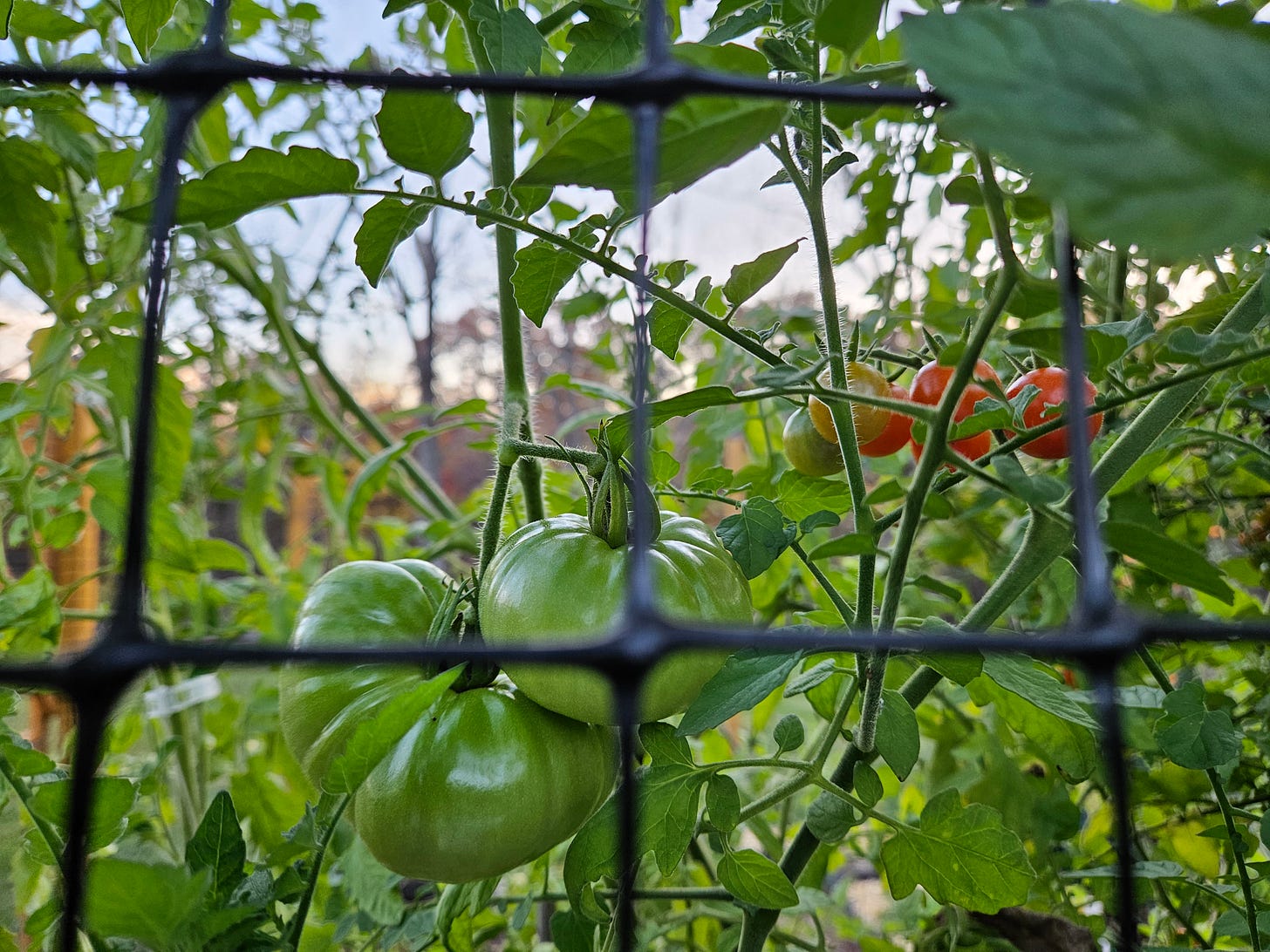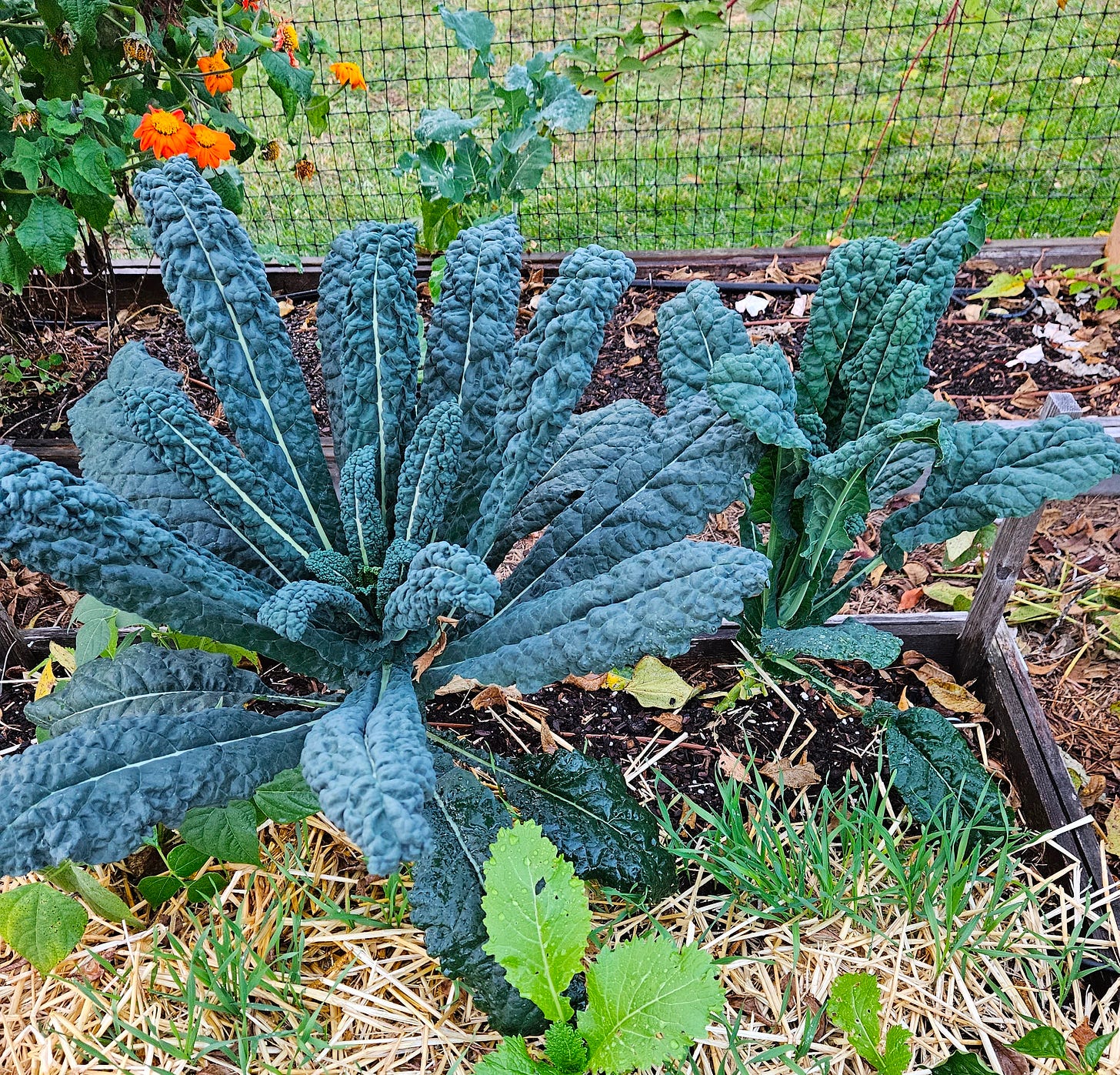The first frost was almost a month late this year, which allowed me to squeeze a few more warm-weather vegetables out of the garden. Every year brings new lessons in the garden. Memories of the summer’s wins and losses in the garden come to mind as I think back over this year. Raspberries and cucumbers were wins. I was glad that I grew a cherry tomato plant—it was prolific! I am still trying to figure out, however, why the cherry tomato plant prospered right next to four different tomato varieties that hardly produced at all this year. My regular tomatoes go in the loss column this year.
My conclusion about why the regular tomatoes did not prosper is that I did not plant a cover crop in the bed or take other proactive steps to improve the soil last fall. The spring frost damage probably also negatively impacted the plants. The cherry tomato plant probably ended up in the best spot in the bed to prosper, may be a variety more disposed to prosper in weak soil, and was well-protected from the spring frost. Although the regular tomato plants were in large part a lesson on what not to do, I am starting to see positive results in other areas where I had put in the work last fall to prepare the soil.
You can see the difference in how certain plants prosper in good soil. Several kale plants exploded this fall and are prospering in a way I had not seen before. The kale will survive during the winter, but I have already planted winter rye next to them with straw to make that bed hospitable for next spring’s planting.
The first frost finally came last week and finished off the summer plants. I came out the following weekend to find dead tomato vines, beans, pepper plants and flowers throughout the garden. Interspersed among the dead plants, however, were the frost-hardy vegetables that survived—kale, mustard greens, carrots, beets, swiss chard, lettuce, sweet peas. It was a sharp contrast between the plants in season that were alive and those whose season had passed and were dead.
Prior to the industrial revolution, our ancestors would have been familiar with the seasons and the changes they bring each year. For centuries, just as with the agricultural cycle, the Church’s annual liturgical calendar has likewise followed the same cycle every year. There is an annual regularity to the observances of the Church that people become accustomed to over a lifetime of worship.
The Church year begins with Advent, a time for preparation for the coming of Christ. There is a sense of unfulfilled expectation that one experiences during Advent, which culminates in our joy at the coming of the Lord at Christmas. We celebrate the joyful seasons of Christmastide and Epiphany. In the spring, we transition to the season of Septuagesima or “pre-Lent.”1 The Lenten season of penance and Passiontide follows. Worship is subdued; the Gloria is not sung at Mass. This season culminates in the Passion of Our Lord Jesus Christ, during which he suffered and died for our sins. Three days after the Crucifixion, we celebrate the joy of Resurrection. Forty days after Easter, the Holy Spirit comes at Pentecost and the Church is born. The remainder of the year are Sundays after Pentecost (now called "Ordinary Time"). There is a rhythm to this annual spiritual cycle that is similar to our seasons of weather and agriculture.
The First Sunday of Advent this year is December 3rd, three weeks away. It will mark the beginning of a new Church year. Will we simply show up and go through the motions again this year? A year from now, will we look back in regret on opportunities lost and time wasted? Or will this be a year we can praise and thank God for growth and victories in our spiritual life? Will we see evidence of good fruit in our lives?
Now is a good time to take inventory of our spiritual progress over the last year:
What were my wins and losses in the spiritual life this past year?
How has God blessed me this year? What am I thankful for?
What lessons did I learn spiritually this year? How can I apply those lessons to the coming year? What can I do to avoid making the same mistakes next year?
What have I done to build a life of prayer?
Where did my spiritual life bear fruit?2
Am I merciful? Jesus said, “Be merciful, even as your Father is merciful.”3
Have I continued to sin without repentance and damaged my soul? If I am struggling with a certain sin, what is the opposite virtue that I can cultivate this year to combat it?
Have I persevered in prayers that I do not see being answered or have I given up?
Have I made any effort to improve the soil of my soul this year?
Our experience in life tells us that spring will follow winter next year. God willing, we will again enjoy seeing beautiful flowers and vegetables in the garden. But as I have been learning, it takes an investment of energy and effort to lay the groundwork for future growth in the garden. If we cut corners on the prep work in the fall, we will have weak plants the following year. And we need to protect the fragile plants from frost in the spring.
No matter how well or how poorly we have done this year in our spiritual life, we can start again. A new season is beginning. But we will have to make a commitment to the Lord and invest energy and effort into our spiritual life in order to lay the groundwork for future growth in the spirit. If we cut corners on our spiritual prep work, it will manifest in spiritual weakness in the future. We also have to avoid damaging our souls with sin along the way.4 With God’s grace, however, we can see good fruit in our lives. As long as there is life, there is hope.
Take courage! God loves you. I pray that the Holy Spirit would grant you light to take true inventory of your spiritual progress over the last year and grace to make concrete commitments for improvement. May beautiful flowers grow in your soul this coming year and may you bear good fruit for the Kingdom of God, in Jesus’ Name. Amen!
Everything Has Its Time
For everything there is a season, and a time for every matter under heaven:
a time to be born, and a time to die;
a time to plant, and a time to pluck up what is planted;
a time to kill, and a time to heal;
a time to break down, and a time to build up;
a time to weep, and a time to laugh;
a time to mourn, and a time to dance;
a time to cast away stones, and a time to gather stones together;
a time to embrace, and a time to refrain from embracing;
a time to seek, and a time to lose;
a time to keep, and a time to cast away;
a time to rend, and a time to sew;
a time to keep silence, and a time to speak;
a time to love, and a time to hate;
a time for war, and a time for peace.5
Eric A. Welter is an employment lawyer and trial attorney with a long-time devotion to intercessory prayer. He is a Catholic Christian who has been involved with intercessory and healing prayer ministry for over twenty years. The Abound in Hope Ministry website is https://www.aboundinhope.org/ministry.
This was removed from the new calendar in the 1960s.
Luke 6:36. The traditional list of the corporal works of mercy includes: to feed the hungry; to give drink to the thirsty; to clothe the naked; to harbour the harbourless; to visit the sick; to ransom the captive; to bury the dead. The spiritual works of mercy include: to instruct the ignorant; to counsel the doubtful; to admonish sinners; to bear wrongs patiently; to forgive offences willingly; to comfort the afflicted; to pray for the living and the dead.
If you are conscious of serious sin, make a good act of contrition and go to confession. The traditional act of contrition goes as follows:
O my God, I am heartily sorry for having offended Thee, and I detest all my sins because I dread the loss of Heaven and the pains of hell, but most of all because they have offended Thee, my God, Who art all good and deserving of all my love. I firmly resolve, with the help of Thy grace, to confess my sins, to do penance, and to amend my life. Amen.




